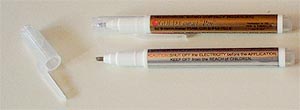 |
|||||||||||||||
 |
|||||||||||||||
| Tweak time. As any car enthusiast knows, cruddy spark plugs impede performance. Ditto for musical sparks. In your audio system, they're supposed to pass from electrical connection to electrical connection and jolt you to high-voltage ecstasy in your strappin' listening chair. Blissful execution. Alas, the signal encounters many real-world hazards of multiple interfaces. From AC posts to IEC contacts; from RCA terminal/plug pins and sleeves to tube pins in your valve amp; from the speaker terminals on your amp and speakers to the spade or banana connectors inserted into them - the signal path is quite the slalom challenge. Like salmon struggling upstream, there's them bears waiting around each and every bend to thin out the dense crowds. Like hustling sperm, only the few and proud make it to their final destination. To enhance the electrons' survival prospects in your signal stream, products like Caig contact enhancers and various de-oxiders attack this issue from both ends: The cleanliness of the contact surface, the quality of the actual contact patch. Corrosion oxidation acts as an insulator, miniature metal pits and wear-n-tear abrasions and gouges prevent gas-tight contacts - molecule to molecule, metal to metal. |
|||||||||||||||
H&H Lab from Japan now offers its felt tip pens filled with 8 nano-meter gold or silver particles. Suspended in shark liver oil or squalene, they are said to infill negative spaces of imperfect metal surfaces. Think of it as a form of gold- or silver plating without the actual plating process. These pens are considered successors to Setten 1's famous Carbon Diatonic which was Japan's best-selling audio accessory a few years ago. The model ZW1 "Da Vinci" ζ-Water package contains precious little English but does describe its intended application as "improvement of electrical conductivity and sound/picture quality". The term 'power water' confirms the intended enhanced signal transfer while a simplified molecular line drawing suggests certain negatively charged particles. Those must be suspended in this fluid to presumably attach themselves to dirt or corrosion and assist in their removal? |
|||||||||||||||
 |
|||||||||||||||
| Another drawing on the carton shows a CD and the proper circular swirl marks of application rather than complete rotational movements that would run in line with the pits. Despite my failure to read the Japanese package instructions, it became clear that this fluid was indeed intended to clean CD/DVDs as well as electrical contacts. Instead of making it a rainy-day project which would have stalled this review far too long -- living in the desert does have its benefits -- I set aside a few hours during one of our very hot summer days. I religiously attended to each and every contact surface in my system, by first spraying Zeta-Water from the 50ml bottle onto it, then polishing it off with paper towels, then painting it with the gold pen whose length is about ⅔ that of a standard pen. Naturally, any audible before-after differences could only be approximated. As with the Olympian sprinter spermazoids of our earlier example, this was a matter of No Return - in this case, to pre-application 'gunky connection' status. My goal for this brief review? Since fellow pilgrim Bill Cowen penned me quite literally to the punch with his SoundStage! review of the gold and silver pens, I'd limit myself to just conveying an approximate idea. How much of an improvement should you expect vis-à-vis other tweaks such as CD demagnetization, CD cleaning, AC purification and resonance control? |
|||||||||||||||
| For context and in my personal tweak scheme thus far, resonance control occupies the corporate office on the top floor - the best views, but also with the highest, most painful triple-net leases. That's followed two or three floors down by superior AC filtration. The majority of the building is then occupied by wishful thinking and exaggerations. CD cleaning lives on the second floor, CD demagnetization hides down in the parking garage. Since high-performance audio is a matter of attending to details; since from a certain point on, it's all about hard-won, incremental improvements; and since 0.5% here and 2% there manage to add up to eventually spell the difference between good and jaw-dropping - the audiophile keen on hot-rodded performance must own even the smallest advantage in the book to stay ahead of Curve Compromise. | |||||||||||||||
 |
|||||||||||||||
The reviewer's job is to assign value for size of gain, describe size of gain such that it becomes a relevant quantity to the reader. With tweaks, he should then tier them such that you could systematically work down the list, from bigger differences to smaller ones until, hopefully and one fine day, there was absolutely nothing left to do and your system won all the races. Naturally, the manufacturers' inventiveness -- for cures to problems you hadn't even considered yet -- tends to outpace our ability to catch up. Hence, tweaking becomes the never-ending game we all hate to love. Many such solutions are affordable and can and should be implemented even with entry-level systems. Others should be considered only after all the fundamentals are in place. Today's tweak clearly falls into the basic category. No mumbo jumbo here. Contact maintenance is simply like personal hygiene - you do it because things get funky if you don't. Fee of admittance, besides elbow grease and patience? $15/22 for the silver/gold pens respectively, $50 for the ζ-Water. For the price of 3-4 CDs, we're securely on no-brainer turf even if the hoped-for improvements hover solidly around the low single-digit percentiles. So did they hover - or fly to Montreal for lunch? |
|||||||||||||||
| They hovered, in the hallways just above CD cleaning, two stories or so higher, with better but similar views - more transparency, more immediacy. As with the just-reviewed GPA Formula shelf, these improvements -- though far more subdued in scope as they should, considering costs -- all belonged into the resolution niche of greater palpability, that see-you thereness that brings especially vocalist performers that little bit closer to you. Accounting for the fact that I couldn't go back, and that it took me a few hours to go through every single connection in the system, I'm hesitant to fall on my sword with any type of blow-by-blow account. First off, I didn't notice any badly tarnished and colored connections. Secondly, rubbing the Zeta-Water off didn't leave any kind of stain or discoloration on the paper towels to confirm visible removal of crud. Still, the noted gains of sheerness and suchness weren't imaginary but real, not drastic in scope but certainly audible and fully commensurate with the very modest asking price these 'audiophile toolbox' gizmos demand. Not brushing your teeth for a day certainly won't pale their white - but it'll give you a dinosaur taste in your mouth. You probably shouldn't socialize either. Not cleaning your connections won't telegraph openly like bad breath since things are slowly degrading over time. But simply from a Physics and pride-of-ownership maintenance perspective? Doing 'it' is about as sensible as brushing teeth - and it happens to be audible even if your contacts weren't visibly scratched to hell, blatantly greened with copper fungus - er, oxide. Though my test doesn't go as far back in time as Bill Cowen's, I too didn't notice any subsequent discoloration induced by the treatment. This confirms his assessment that unlike earlier products, the Hamada pen application doesn't leave a mysterious layer of unobtainium on the metal that will eventually interact with it in strange, unbecoming ways. |
|||||||||||||||
 |
|||||||||||||||
No, these H&H Lab products are easy to use, don't suffer any small print contra-indications and could make an even bigger difference than I heard - if your last application of Craig Pro Gold or equivalent went back farther than 6 months; if, embarrassing as it should be, you've never yet cleaned 'them' even once yet. Be a good sport and give your system the brain food it needs so its synapses fire loudly and effectively. What's fruit sugars and sardines in the human organism is clean, optimized contacts in your audio rig - and these gizmos are one easy way to create 'em. Recommended! I'll report on the CD cleaning properties of the mysterious water --can you think 'Spice' from the Dune trilogy? -- in our next tweak installment. I'll compare it to the Walker Audio Vivid and LAST Factory fluid. |
|||||||||||||||
You see, I can tweak only so much before I need a break - or else I feel as though I'd lost touch with what all this really is about: Mounting them tunes to ride off into the sunset, like Keisho Castle-Hughes as Pai mounted her whale in the stunning Maori coming-of-age movie WhaleRider. |
|||||||||||||||
 |
|||||||||||||||
 |
|||||||||||||||
|
International distributor's website
|
|||||||||||||||
 |
|||||||||||||||